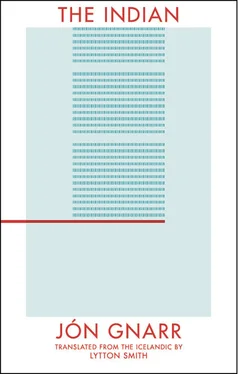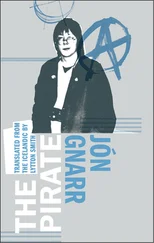Our house is a concrete, two-story townhouse, the last house in a block of three; our house is number one. In front of the house is a parking space. In the basement is a two-bedroom apartment with its own entrance, which faces out into the back garden. Mom and Dad rent it out.
Our apartment is huge. The entrance leads into a large hall. On the right hand there’s a little storage room and a large kitchen overlooking the street. Straight ahead is a massive living room. Off from the living room is a television room with bookshelves. From the living room you can walk into a large storage room with a fridge. From the storage room, steps go down to the lower level where there’s another storage closet. You can walk out to a balcony from the living room; the balcony faces south. From it, there are views over Fossvogsdalur and up as far as Kópavogur. The balcony has two doors: one into the living room, the other into the master bedroom.
When you go left from the hall, you pass a huge walk-in closet. Off the hall, on the left-hand side, two bedrooms face the street. The first is my sister Runa’s room. Later, after she moves out, it becomes a telephone room. For a time, it’s also Grandma Guðrún’s bedroom. She lives with us while she waits for space to open up in the nursing home. Next to that room, in the corner, is Grandma Anna’s room. She only lives with us for a few years, up until her death. After that, her room automatically becomes my room.
Next to my room there’s a big bathroom with a bathtub and a little laundry nook for a washing machine and a sink. There’s no window in the bathroom except for this weird roof-window which passes through the attic.
Beside the bathroom, at the end of the corridor, is a double bedroom. That’s the largest bedroom; it has built-in closets. I sleep there for my first few years, along with Mom and Dad. And over the whole house there’s unused storage space. The house is surrounded by a fenced-in lawn.
I have three siblings. They’re all much older than me. My brother Ómar is 25 years old when I’m born, and has long since left home. I have two sisters. Kristín is 20 years old and she’s moved to Norway. Runa is 12 years older than me.
My family are ordinary, Icelandic people. As well as being a housewife, my mom is a female domestic: she works in the kitchen at City Hospital. She was born and grew up in Reykjavík, the youngest of eight sisters. My grandfather studied as a mason but didn’t work much because he was sick. He had arthritis and died long before I was born. Mom told me about him. His fingers were so afflicted that he couldn’t move them. Grandma Anna, Mom’s mom, was a housewife. Despite being sick, my grandfather saw to it that my mom and her siblings were supported so that no one went without. They all lived together in a tiny apartment in the old part of Reykjavík. My mom’s older brothers begged work here and there and foraged food for the family, usually fish which they bought from some men in the apartment below who owned a small motorboat. It was a tiny luxury.

My dad was born in 1918 during the Great Frost. That was a very difficult year for Icelanders, and for the whole world. In the same year, the Spanish flu raged; over 300 Icelanders died. But not Dad.
It was also the same year that Nicolai Bjarnason planted his sycamore garden on the corner of Suðurgata and Vonarstræti. He didn’t know then that it would later become a parking lot.
My dad was born, and grew up, “out west,” one of six siblings. His father was a foreman and a mailman. His mom was Grandma Guðrún.
I didn’t ever meet my grandfather. He died long before I was born, like my other grandfather. He had tuberculosis and had to go to a sanatorium for several months. He recovered to full health, and went back west during the mild-tempered weather of the summer of 1954. He made the journey by boat across Breiðafjörður but sank on the way, somewhere in the middle of the fjord, together with all the men and all the rats. They never found debris or any sign of the boat. After that, Grandma moved south with the children.
Dad was over twenty when he came to Reykjavík. He wanted to be an actor and enrolled at a drama school but had to drop out because he was too poor. He couldn’t afford to buy himself food, never mind pay the tuition. At that time, there was a need for policemen. Dad went along and, because he was unusually brave, he was hired on the spot. Reality won out over dreams.
He worked as a police officer for 40 years, a good employee who never missed a day of work. Despite this, he never gained any distinction in the force because of his political opinions: he was an affirmed Communist. He walked the streets, fought violent men, attended car crashes and took on things others didn’t care to see. Finally, and as a formality, he was promoted to sergeant and got to sit in the lobby. By that time, he had really weak legs because of his decades walking around in inferior shoes on behalf of the State. Later, the State made up for its stinginess by giving him replacement hips.

Grandma Anna and sister Runa, who has just completed Confirmation move into the new house with me and my parents.
Runa isn’t happy about the move since she’s being torn away from her friends and having to move to the “ass-end of nowhere.” Fossvogur is a suburb of Reykjavík which many consider the absolute limit of the habitable world. It’s more or less the country, since sheep graze in the valley and even the town of Kópavogur is some place far off in the distance.
Grandma Anna has gotten senile. She doesn’t always know who we are. She doesn’t know who I am. At times she’s also really angry about something or other. She always thinks that she’s being abused in some way. She cries a lot and occasionally screams. She believes she never gets fed. She’ll have only just finished a meal and gone into her bedroom when she comes back out again.
— I gather there’s not going to be any food, just as usual.
She starts to sob.
— Aren’t I allowed to have some food? she asks Mom.
— You just ate, says Mom.
At this, Grandma breaks down and bursts into tears.
— You should be ashamed of yourself, treating me like this, she wails.
Mom sighs.
— I was never so mean and stingy a mother that I scrimped on giving you enough to eat.
Any food she can find she stashes in her room. Sometimes she creeps out into the kitchen, taking food and bringing it back to her bedroom to hide. I swear I’ve seen her slip a whole fistful of fish fingers into her bathrobe pocket. In the drawer of her dresser, in with her underwear and her trinkets, lie remnants of moldy bread and putrefying meatballs. Mom regularly goes through her things; a bad smells gushes up, but Grandma screams and complains.
— Are you planning to starve me all the way to the grave?
Sometimes she give Runa her clothes. Then she cries because Runa doesn’t want to go out in them.
— Mom, Grandma keeps giving me this hideous blouse.
She holds up a knitted northern shirt. Mom laughs.
— I can’t stand it when she does this!
One time, Runa came into her bedroom to find Grandma setting folded underwear on her bed. Runa got really mad.
— Mom, will you take this disgusting stuff away?
Grandma cried her eyes out when she saw that Runa didn’t want to wear her underwear. She thought she was ungrateful and snobbish.
— Shame on you, disdaining these good things I’m giving you!
— Mom!?!
Our cat, Steamball, also moves into the new house with us. Steamball is a really dangerous brute. She won’t tolerate strangers and attacks people who come to visit us. She comes running and jumps on people without warning, lunging with her mouth and claws extended.
Читать дальше




![О Генри - Бабье лето Джонсона Сухого Лога [The Indian Summer of Dry Valley, Johnson]](/books/407344/o-genri-babe-leto-dzhonsona-suhogo-loga-the-india-thumb.webp)









